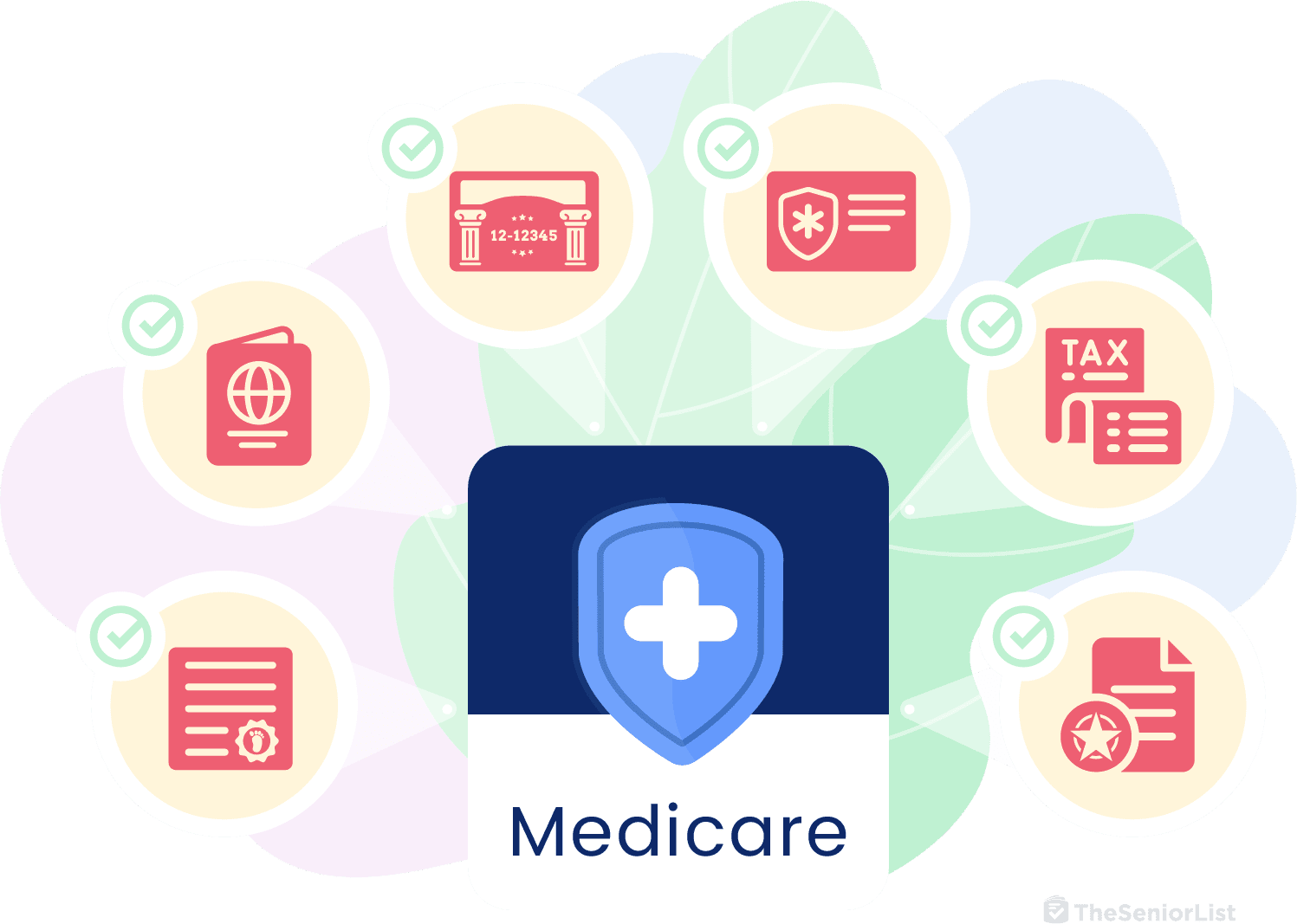What Documents Do I Need to Apply for Medicare?

To apply for Original Medicare, you’ll need your birth certificate, health insurance info, Social Security card, and potentially citizenship verification. However, if you enroll in additional Medicare parts such as Medicare Part C, Medicare Part D, or Medigap, you won’t need to submit additional information.
Medicare Eligibility
Your Initial Enrollment Period for Medicare lasts for seven months, starting three months before you reach the age of 65 and ending three months after. Eligibility for Medicare benefits is available for people age 65 and older. However, depending on your situation, you may be able to receive Medicare before age 65 if you have a disability, ESRD, or ALS.
What to Bring When Applying for Medicare
If you’re collecting Social Security benefits before you turn 65, you’ll automatically be enrolled in Medicare. You won’t need to dig up any documents to apply. The same goes for being eligible due to collecting SSDI after 24 months.
Whether you’re applying in-person, by phone, or online, you’ll want to make sure you have all of your documentation and information readily available. Here is an overview of what you might need:
- Birth certificate: You will need to provide proof of birth or an original birth certificate. Other acceptable forms include medical, insurance, and immunization records.
- Proof of U.S. citizenship or legal residency: This can include a passport or another form of legal documentation to prove citizenship or legal residency. If you’re not a U.S. citizen, you can show another form of residency such as a green card.
- Social Security card: You will need to have your Social Security card or a record of your Social Security number.
- Proof of health insurance: You will need proof of health insurance for Medicare eligibility. Copies are acceptable.
- Tax information: This can be a copy of your past W2 statements or proof that you pay self-employment or other taxes. Providing this information can help you figure out how much you’ll pay for different Medicare parts.
- Military documents: If you receive military or veteran benefits, you can show documentation and other records of your service.

Documents to Enroll in Only Part B After Leaving Group Coverage
If you delayed enrolling into Part B due to having group employer coverage, you will need to complete the form CMS-L564. For this form, you’ll have to ask your employer to fill out Section B. Once completed, you’ll need to submit it to Medicare along with form CMS-40B.
Documents for Medicare Advantage and Medigap
Whether you sign up for Medicare Advantage or Medigap, you’ll need both your Medicare number and the date your Original Medicare coverage started. This information will be on your Medicare card. You can also access this information through your dashboard on the Social Security website if you created an account to enroll.
FYI: Medigap covers the gaps in Medicare such as copayments, coinsurance, and deductibles. Read my guide on the best Medicare Supplement plans.
What If I Lost My Documents?
If you lost your documents or can’t locate them, you still have time to obtain new copies before applying for Medicare. This involves contacting your state or local offices for copies of records and other documents that you might not have readily available. Here’s how you can obtain new copies.
Birth Certificates
If you can’t find your original birth certificate, you can reach out to the Vital Records Office in the state where you were born. There may be a fee to get a copy of your birth certificate, as well as for expedited service.
If you are an American born abroad, your parents might have registered your birth with the U.S. embassy or consulate. For a copy of the report, reach out to the U.S. Department of State or contact your birth hospital.
Permanent Resident Card
If you’ve lost your Permanent Resident Card, fill out Form I-90, the Application to Replace Permanent Resident Card, through U.S. Citizenship and Immigration Services (USCIS). You will need to provide the required documentation and pay a filing fee. If your application is approved, you’ll receive a receipt that shows proof of your permanent resident status for 12 months from the expiration date.
The general filing fee is $415 if you file online or $465 if you file by paper.1 You can pay the nonrefundable fee with a money order, personal check, cashier’s check, or credit card. Be sure to use Form G-1450, Authorization for Credit Card Transactions, to complete the application.
Certificate of Citizenship
To request a copy of your Naturalization Certificate, Certificate of Citizenship, or any other special certificate of naturalization, use USCIS’s Form N-565, Application for Replacement Naturalization/Citizenship Document, which can be submitted online or by mail.
The general filing fee is $505 if you file online or $555 if you file by paper.1 If you decide to file by mail, you must pay the nonrefundable filing fee via money order, personal check, cashier’s check, or credit card using Form G-1450.
Military Service Records
If you’re a veteran or next of kin, you can obtain free copies of DD Form 214 (Report of Separation) through the National Archives for Veterans’ Service Records. These records can be processed in approximately 10 days.
Alternatively, you can request your military service records at no cost through an online VA portal. In order to retrieve the records, you will need to sign into the VA’s milConnect portal and create a Premium DS Logon account. You can also mail or fax a Request Pertaining to Military Records to the National Personnel Records Center (NPRC). Alternatively, you can obtain Form SF 180, write a letter to the NPRC, or contact your county’s veterans’ agency.
Earnings Statements
To provide proof of earnings, you can access your yearly earnings totals for free by completing the Request for Social Security Earnings Information (Form SSA-7050). However, if you need more itemized or detailed earnings information that is not related to Social Security programs, keep in mind that there will typically be a fee attached.
Submitting Without Copies
If you don’t have some of the copies of the documentation, try reaching out to Social Security. You can most likely request copies through your state’s records bureau as well.
Enrolling in Medicare
Once you’ve got all of your documents in order, you’re ready to apply!
Additionally, check out some of my other Medicare resources:
Medicare Documents Frequently Asked Questions
-
What is the best way to apply for Medicare?
The best way to apply for Medicare is online at socialsecurity.gov or by speaking with a representative at 1-800-772-1213, Monday through Friday, between 7:00 a.m. and 7:00 p.m.
-
How long does it take for a Medicare application to be approved?
Depending on the application method that you choose, approval by phone, mail, or online can take 30 to 60 days. However, applications can be processed as quickly as three weeks.
-
What do I need to do to enroll in Medicare?
You will need basic information and documentation such as your Social Security card, citizenship status, birth certificate, earnings statements, federal pension information, your spouse’s Social Security number, as well as other specific information.
-
Is it mandatory to go on Medicare when you turn 65?
No, it’s not mandatory to go on Medicare when you turn 65. However, declining the federal benefit can end up being complicated in certain scenarios due to penalties for late enrollment.
-
How much does Medicare cost at 65 years old?
According to Medicare.gov, most people don’t pay a monthly premium for Part A. For 2026, the standard monthly premium for Part B will be $202.90, though this can be higher depending on your income. The premiums for Part C and D vary from plan to plan.


